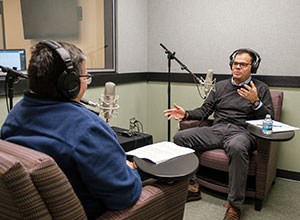Educated Workers and America’s Competitiveness
This 3-minute podcast was released Aug. 31, 2020.

Alexander Monge-Naranjo, research officer and economist
“The world is not so one-sided anymore. And the U.S. can benefit from the contributions of people coming from other countries,” says Alexander Monge-Naranjo, research officer and economist at the Federal Reserve Bank of St. Louis. In a brief podcast episode, he chats with Greg Cancelada, managing editor of On the Economy, about both the challenges and opportunities presented to the U.S. as the rest of the world becomes better educated.
Transcript
Greg Cancelada: Welcome to Timely Topics, a podcast series from the Federal Reserve Bank of St. Louis. I’m Greg Cancelada, your host for this podcast. With me today is St. Louis Fed economist Dr. Alexander Monge-Naranjo. Alex, thanks for being here.
Alex Monge-Naranjo: It’s my pleasure.
Cancelada: You wrote a fascinating article in our publication the Regional Economist about U.S. competitiveness in the area of higher education. For example, in 1950, you showed how the U.S. had the highest percentage of workers who had graduated from college among developing countries. But by 2010, Japan and South Korea have surpassed the U.S. in the percentage of these workers and other countries are steadily narrowing the gap. What do you think this means for America’s competitiveness? Is this something that the U.S. should be worried about? Or is this something that is just part of the natural progression of development globally?
Monge-Naranjo: I think both. First, I don’t think the U.S. should be really worried about just being ahead of the curve. Because you can be ahead of the curve, but the curve is really low. I mean, other countries are lagging behind and “I’m No. 1” because everyone is lagging behind. That’s not the right metric.
I was actually quite shocked when I was looking at this data. Because I was expecting the U.S. to be ahead, but not so far ahead. And then I was expecting the countries to have caught up, but not so much to the point that some of the East Asian countries were actually above the U.S.
What I think this data represents is that the world could be a more interesting place. I mean, back in 1950s, after World War II, the world was kind of divided between, you know, the Soviet Bloc and the U.S. There was a group of third countries. But effectively the U.S. had a relationship that is one sided. It was way ahead. It had more capital, had more financing. And moreover, that’s where the scientists and engineers and the intellectual ideas and intellectual property was essentially coming from.
And as time goes by, what we see is that there is other countries, notably first Japan, later Korea, and who knows? But it looks like China is going to become a major center of technology and science and development. It produces that the world economy for Americans I think is going to be way more interesting, is more challenging in the sense that Americans are not only competing with other Americans—I mean, the country’s large enough and we know that there has always been, you know, potential competition just coming from inside the U.S.—but now there is the possibility of using ideas and technologies that are generated from other places.
Deep down, I think there are challenges. But also there are interesting opportunities. The U.S. can benefit its productivity, access to new goods, to new services, medical breakthroughs, so on and so forth can come from other places. So the world is not so one sided anymore. And the U.S. can benefit from the contributions of people coming from other countries.
Cancelada: All right. Great. Well, thank you very much, Alex.
For more Timely Topics podcasts, you can visit stlouisfed.org/timelytopics. You can also stream this series on Apple Podcasts, Spotify and Stitcher, or you can ask your Amazon device, “Alexa, play Timely Topics from TuneIn.”

